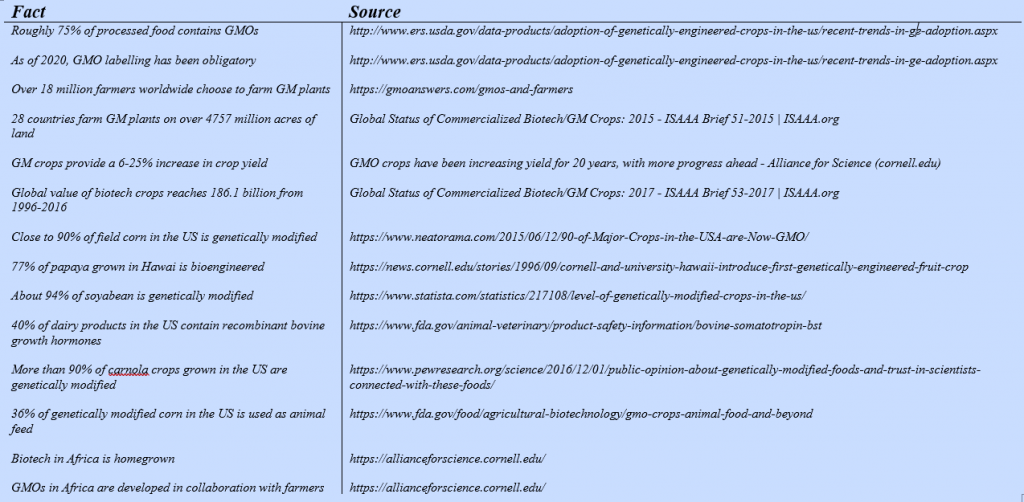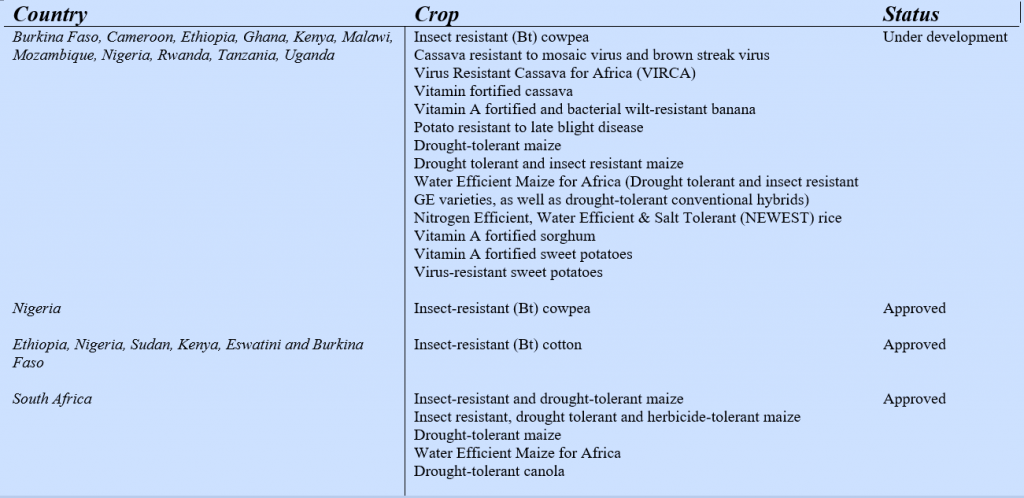What are GMOs?
Genetically Modified Organisms (GMOs) are organisms that have had their DNA artificially modified or altered by humans with the help of modern genetic manipulation techniques. The genomes of such organisms are the target of the biotechnologist because it confers the whole genetic material (DNA) which defines an organism (1).
Man’s artificial altering of the genomes of organisms (plants and animals) has existed for 1000s of years via selective breeding techniques (2). The only difference today has to do with the advancement of science and technology which has led to the speeding up of the processes involved in the artificial alteration of organisms’ genetic material. Today’s advancement in genetic engineering techniques means that the speed it will take to incorporate a specific genetic material from one organism to another of the same kind or unrelated species has been relatively shortened or enhanced (1).
How genetic modification happens

Accepting GMOs in a country
Very few nations completely forbid the import or cultivation of genetically modified organisms (GMOs). All nations, including the United States, have laws and regulations governing biotech crops, thus it is not possible to develop a GMO crop and have it available for purchase the next season. The production of GMO foods must adhere to the strictest safety regulations set forth by a nation, and there are systems and laws in place to assure this (3).
GMOs are often tested following the Cartagena Protocol on Biosafety or other biosafety laws before high-level risk assessments are carried out following local legislation as well as regulations governing the safety of food and feed for most countries (4). For example, anyone attempting to create genetically modified organisms (GMOs) in Ghana would need to obtain approval from organizations, including the National Biosafety Authority, the Ministry of Agriculture (MoFA), the Food and Drugs Authority (FDA), the Ghana Standards Authority (GSA), and the Environmental Protection Agency (EPA).
Historical perspective of GMOs

There have been a lot of concerns about GMOs globally but from a historical perspective, GMOs tend to be integrated into the system in one way or the other. The GMO pros and cons debate rages worldwide, however, data in favour of GMOs that will help an informed decision for a country like Ghana includes;
Table 1 Global facts about GMOs

How long have Ghanaian researchers been working with GMOs?
Until recently, many African countries have resisted the research and cultivation of GMOs but the pace and rate of taking up GMOs is gradually increasing. Researchers in Ghana have been working tirelessly toward the approval of GMOs since the early 2000s. In 2011 Ghana passed the Biosafety Act (831) which allowed the introduction of GMOs. This legislation was projected to be the parent material to bring the country its first GMO seeds for commercial purposes. To date, a temporary injunction that was placed on the commercialization of GMOs has still subjected Bt cowpea and GM rice to pending approval even though genetically engineered products are still been imported into the country.
Arguments in favour of GMOs in Ghana
In Africa, the benefits of GMOs are already being reaped by some countries such as South Africa, Nigeria, Ethiopia, Sudan, Kenya, Eswatini and Burkina Faso. There are currently two types of uncommercialized GMO crops in Ghana still undergoing trials, which are the BT cowpea and the new rice with the former just a step close to gaining approval. Table 2.0 below provides data on the growing success of genetic literacy and the acceptance of GMOs in Africa. This indicates the insurance of the DNA revolution in Africa and sooner or later, Ghana will have to accept this modern scientific way of improving especially agriculture to benefit the farmer, the consumer, the environment and the nation as a whole.
Table 2 Data on the status of GMOs in some African countries

Sometimes scientific innovations are perceived by individuals as a bit scary. It is understandable in the case of Ghana that there have been crusaders who are championing the rejection of GMO commercialization but as it stands, Ghana does not have the luxury to reject GM technology looking at the many benefits it could add to its economy. Regulations play a major role in how people tend to accept innovations and if GMOs aren’t introduced in Ghana it would have to be a result of poor regulatory capacity owing to a failure in the chain of policy formation and legislation. At this point achieving SDGs 1 (eradicating poverty), 2 (achieving zero hunger), 13 (addressing climate change), and other interconnected SDGs will tend to be a hard battle to tackle because conventional agriculture cannot meet the demands of the growing Ghanaian population due to several factors including climate change.
Conclusion
From a common sense perspective, biotechnology promises a brighter future and the world has no choice but to embrace the innovations that come out of it. In the agriculture sector of Ghana, for instance, the biotechnology revolution would help bring in high economic returns due to reducing the cost of weed, disease and pest control and aside from that it has the potential to boost agriculture and ensure food security for all.
GM technology will bring about drought tolerant, early maturing and high-yielding local crop varieties with other perceived benefits including reducing the environmental risks of farming, meeting consumer tastes and improving food security. These benefits will however be reaped following a moderate cost of GM seeds or seed subsidization for smallholder farmers, and an increase in genetic literacy because of the fear that GM seeds might not be reliable and pose serious health and environmental risks.
When GMOs are introduced in Ghana in the future, it will also help in the production of healthier and more productive crops. Finally, food wastage will be reduced as a result of the extended shelf life of farm produce. There will also be improved nutrition through enhanced staple crops with increased amounts of essential vitamins and minerals. It is highly recommended that the case of GMOs is managed just like the way other scientific innovations have been managed so that the full potential of this innovation is benefitted by all.
References
- Tagliabue G. The central dogma, “GMO” and defective epistemology. GM Crops Food. 2017 Oct 2;8(4):209-215. doi: 10.1080/21645698.2017.1405899. PMID: 29173000; PMCID: PMC5790417.
- National Research Council (US) Committee on Identifying and Assessing Unintended Effects of Genetically Engineered Foods on Human Health. Safety of Genetically Engineered Foods: Approaches to Assessing Unintended Health Effects. Washington (DC): National Academies Press (US); 2004. PMID: 25009871.
- GMOs Around the World. https://gmoanswers.com/gmos-around-world
- Ahmet B. Sema G. Study of an overview on GMO’s legislation and inspection system in Turkey. https://www.researchgate.net/publication/280385759
